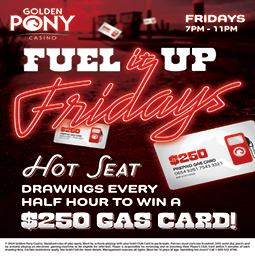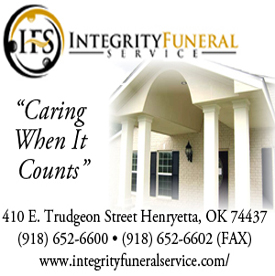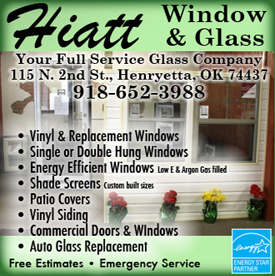People older than me can recall earlier Henryetta Chiefs of Police than I, such as long-time lawman J. E. Tate, who was grandfather of one of my HHS 1948 classmates and must have been chief at some time in the 20s and early 30s. Though I didn't know the earlier ones, here's a ditty about three I recall.
In the 30's and 40's, the Police station and jail were in the bottom floor of the old City Hall at Fifth and Broadway, and was entered from the south side of the building.
Some entry steps went down (I think some steps were outside the door and some were inside) to a floor that was a few feet lower than ground, 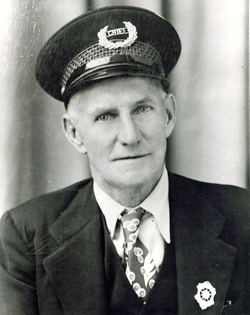 An old radio set was just to the east of the inside steps. Further back, there were three cells that were probably below upstairs offices but not as far north as the Fire Station.
An old radio set was just to the east of the inside steps. Further back, there were three cells that were probably below upstairs offices but not as far north as the Fire Station.
As I recall from the one instance when I saw the cells (no, I was not confined), each was large enough to hold multiple prisoners.
Henryetta had very few policemen in those days maybe five and just one night policeman who patrolled Main Street on foot. There was probably another at night to answer calls. There was one police car.
The first Chief I recall was Tom Liddell. He was probably a good Chief, and wore a black billed cap and black uniform.
The main reason I recall him was that he sponsored a student patrol program for the grade schools. Each grade school had student patrolmen at nearby corners to help safeguard the kids as they crossed the streets going to and from school – and generally pester them with our self-made rules.
At Webster, Washington, Irving Jefferson and St. Michael's, they were sixth graders, but Roosevelt, where I attended, and Francis Willard, just had four grades. So I was a fourth grade patrolman in 1939-40.
We had white belts that went around our waists and angled up over our right shoulder, and a badge. We were pretty spiffy in those belts and in the striped overalls most of us wore.
The best thing about Chief Lidell was an arrangement he made with Dick Klein, manager of the theaters, for school patrolmen to be admitted free to Saturday afternoon western movies. We were to arrive at the Morgan theater by 1:30 and when he arrived to confirm that we were all patrolmen, we'd be admitted.
There were 40-50 and we all arrived early so we'd be sure to be there when he arrived. He was nearly always late, so there was usually a 30-45 minute period with a bunch of 9-12 year old boys waiting outside the Morgan entrance, crowding the sidewalk, pushing, shoving, wrestling, playing leap-frog, chasing one another, and who knows what.
Keeping the area clear nearly drove the movie staff nuts and we began to think Dick Klein must be tougher than the police. We didn't improve the day for Ted Berry at his next door Arcade cigar store, either.
Finally, Chief Lidell would arrive and we'd get in to see Wild Bill Elliot, Jimmy Wakely, Roy Rogers, Gene Autry (who lived in Henryetta as a Frisco dispatcher for three brief periods), and the rest of the long ago cowboy movie stars.
Indians (now properly called Native Americans) always came in from the country to watch, and even as a boy, I wondered why. In the movies in those days, they were always talked about in disparaging terms, always won a first surprise attack on the western whites, and then lost the battle that counted. I didn't know if they thought they'd win the next battle or what, but they were always there.
The cowboy feature movies were less than an hour long because kids had short attention spans and the simple plots didn't need added scenes to help even kids figure them out.
Besides a cartoon and previews of coming attractions between features, each Friday and Saturday, they showed that week's chapter of a fifteen chapter western serial. Each week's chapter ended with a disaster that gave the impression that the hero was about to be killed by an explosion, a fall off a cliff, being hit by a train, or some other crisis. Serials were really teasers to get people to come back to see if or how the hero survived.
The next week, camera shots of the last minute of the prior chapter changed slightly and you saw something you didn't the week before that enabled the hero to survive until the next disaster at the end of that chapter.
It was quite a feat to see all fifteen chapters of a serial, but I never did. One was already underway when the school year started and another was nearing the end when it ended. All 15 chapters of the one between were shown, but I missed one. I'd had a cold and missed school on Friday – a rarity for my sisters and me. Saturday morning, I was better and Mother told me I could go, but then I spent the morning with friends at Coal Creek catching minnows and crawdads, swinging on vines across the creek, etc., and didn't get home in my muddy clothes until I was late for lunch.
Mother decided it was a good day to stay home and think of ways to improve my behavior. This wasn't the only time she did that I sometimes had a hard time catching on to things like that.
Another of my main memories of Tom Lidell, was when I watched the entire police force, plus at least as many other local citizens, trying to arrest a terribly intoxicated man and drag him from Fifth and Main to jail.
A crowd, including kids on the way home from school, watched the whole affair. Describing all of it would take too much space, but oh, the words I heard that day, and sticking with the action clear to its end afforded me my one glimpse at the jail cells.
There is one more memory of Tom Lidell, which isn't pleasant. After he retired, I had a Free-Lance paper route and he was a customer. He was evidently hard of hearing because when I knocked to collect each week, he seldom heard me.
When he died, he owed me for five weeks of the paper, which was 75 cents at the rate in those days. (I got to keep 6 cents a week, but not for those five weeks because I didn't get them collected. In the end, I lost 45 cents for the 9 cents a week I had to pay the Free-Lance.) Still Tom Lidell was a Chief I liked.
Lem Tunnel owned a shoe repair shop on Main Street, nearly directly across the street north from the Blaine Theater. There were other shoe shops – like William's Shoeland and Marler's Shoe Store, and naturally J. C. Penny and other stores like Kaufman's, Herrins, Hamra's, Whipps and Bruton-Owen, but I am pretty sure Tunnel's was just a repair shop that and is where my “Jim Kirby event" took place. 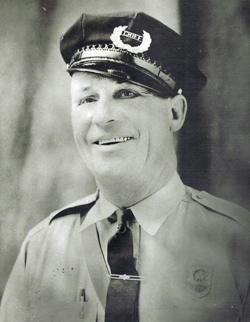 Mother sent me to Tunnel's to get my shoes repaired and there was a traveling salesman there as I waited for them to be fixed.
Mother sent me to Tunnel's to get my shoes repaired and there was a traveling salesman there as I waited for them to be fixed.
Chief Kirby happened to walk in and Mr. Tunnel introduced the salesman to him. He then told Chief Kirby the man could tell a person's occupation just by feeling their feet, and asked him to let the man try. E
ven as a little kid, I thought that wasn't a fair test because Chief Kirby's police uniform was a dead give away about his occupation. Well, after Chief Kirby sat down and took off a shoe, the man felt around on his foot for a while, looked up and said, “Why, you have the feet of a truck driver."
Tunnel, Kirby and I all laughed because we all knew he'd been a milk truck driver until just a few months before. It was the first time in my life I thought I'd met a true expert. As I grew older, I began to wonder if Mr. Tunnel hadn't seen Chief Kirby coming and whispered to the man that he used to drive a milk truck so they could fool him. Nah!
The next Chief was Jim Kirby. He'd been a home delivery milk truck driver for Holiday's Dairy for several years, was well-known around town, and was elected or named Chief when Tom Lidell gave up the position.
He wore a spiffy uniform with a tailored white shirt, a black and white cap that had designs on the bill, and black trousers with a stripe up the side. Though he was well liked around town and everyone knew him, he didn't continue the school patrol program, so when I reached the sixth grade at Washington, there weren't patrols.
Back then, it was common for people to get shoes resoled or get new heels as soles or heels wore out , times were tougher in the depression and people had to save where they could.
I was in high school when Chester Baird followed Jim Kirby as Chief of Police.
There were more policemen by then, including Pete Sardo, a returned WWII serviceman whose job was to empty the new parking meters and write parking tickets as he whistled so loud everyone on Main Street could hear him even when he was two or three blocks away, and Talmadge Watkins, who wore the spiffiest uniform of all, took his role very seriously, was a good policeman, but was also a bit of a pre-TV version of Barney Fife.
But after saying that, I must also say that both of them had served our country in WWII and both had succeeded in getting jobs they were very proud to have at a time when many returned veterans were having trouble doing that ‚ but that is another story.
I'm sure Chester Baird was a good Chief of Police, but I, like other high school boys, thought we were smarter than all the policemen combined. I'll pass on describing the silly things we did just to irritate them to try to prove we were smarter, and get to the Chester Baird event I remember most. But first, I must say that my friends called him "Smiley" when talking with each other, but never within his hearing.
As a senior at HHS, I did something that upset my father and was told I couldn't have the car on Saturday night, and even if I had a date, I had to be home by 11:30. So I took a girl to the Blaine theater on foot and walked her home. She lived near Twelfth and north of Main.
I lived on State, a block south of Corporation, 16 blocks from her house. I left her front porch at 11:20, and realizing that if I wanted the car the next week, I'd better get home pronto, I started running. I first ran to Main and then to Fourth, where I turned south and figured I was doing okay. 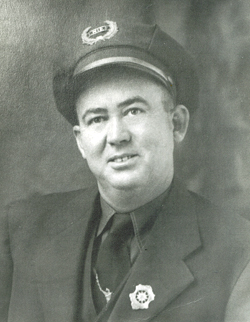 But south of Moore and just before reaching the Frisco tracks, Henryetta's police car pulled up on Fourth and someone told me to stop. I quickly realized it was Chief Baird, with another policeman driving - probably Watkins.
But south of Moore and just before reaching the Frisco tracks, Henryetta's police car pulled up on Fourth and someone told me to stop. I quickly realized it was Chief Baird, with another policeman driving - probably Watkins.
The chief asked why I was running, and not wanting to admit I had a curfew, I said I liked to run. He then said no kid would be running at night just for the heck of it. So I asked, "What's the matter, Smiley, don't you ever try running?" Big mistake! He got out, opened the rear car door, and sat me in the rear seat almost in one motion. It was clearly time to stop smarting off.
They drove me to town and parked in front of the old J. C. Penney store that stood on the south side of Main between Third and Fourth. A crowd had gathered because someone had thrown a brick through one of its big windows, and when they saw me turn the corner at Fourth and Main (before I even got to Penney's, which I never did while running) they decided it might be me and came after me.
I declare, I thought I knew nearly everyone in town, but there wasn't a person I knew in that crowd. The inside car lights were on and a lady put her face to the window, went "tsk, tsk" at me, and I said, "Hey lady, it wasn't me!" Then someone said I didn't look like the person they saw do it, so Chief Baird told me to go home. By then, I'd missed my curfew and piped up, with "Go home? Take me back where you found me." He told me to get out of the car and scram, and based on the earlier experience with him, I scrammed.
I was about twenty minutes late. My father was asleep in bed, so I went to wake him up and tell him what'd happened. I figured I had lost the use of the car for another week, but my father thought my whole experience was funny, and rolled over to go back to sleep.
I got to use the car the next week. I don't know if they ever learned who broke the window. I headed off to Tulsa for college the next year and don't recall who followed Chester Baird as Chief of Police.
Henryetta’s Chiefs of Police in the 1930s and 1940s
- Details
- Written by Earl Goldsmith









